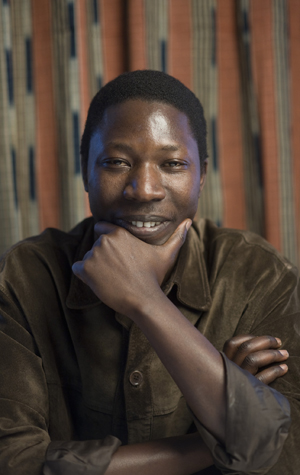African Language Scholar Wins Guggenheim Fellowship
CAS prof sheds light on centuries-old written language

When he was growing up in Senegal, Fallou Ngom spoke six languages. He has applied his fascination with language toward cultivating knowledge of, and respect for, a written derivative of Arabic script called Ajami. Although long ignored by colonial powers and the West, Ajami is found in villages all over Senegal, Guinea, and Niger, where it remains a leading written language of commerce, legal documents, journals, even poetry.
Now the role of the College of Arts & Sciences associate professor of anthropology and director of the University’s African Language Program in promoting Ajami has won him a 2011 Guggenheim Foundation Fellowship.
Frequently referred to as mid-career awards, the fellowships are awarded to people who have already demonstrated “exceptional capacity for productive scholarship or exceptional creative ability in the arts.” The foundation awards about 220 fellowships a year, chosen from 3,500 to 4,000 applicants.
News of the award surprised Ngom, he says, because he’d forgotten he applied for it. Seated in his Bay State Road office, wearing his signature leather cowboy hat, Ngom “didn’t bank on it,” he says. He applied last summer while sitting on a bench outside his office, facing the river. He calls the bench his arbre a palabre, an urban variation on the African baobab tree, a traditional gathering place.
“I have a routine,” he says. “I eat my lunch and sit outside, check email, and look at things I haven’t had time to look at.” An email led him to the Guggenheim application, and he spent the rest of the day to completing it. The unexpected windfall means that he will have more time for research and writing, he says, which is “what I’d hoped to do, if I had the time.”
The Guggenheim grant will also help Ngom nurture other Ajami scholars, as well as continue his work in Senegal and neighboring countries long considered by UNESCO to be largely illiterate, but that have actually been fluent readers of Ajami. Ngom describes the mutated Arabic as a centuries-old system that reads phonetically as a range of spoken African languages such as Wolof, Pular, Amharic, Hausa, Swahili, Tigrigna, or Berber. Ajami was initially created by Islamic teachers to disseminate their religion among subliterate African populations. But Ajami eventually played a role in fueling and sustaining regional forms of Islam distinctive to sub-Saharan Africa.
“In the past, these Ajami documents were regarded as footnotes,” says Ngom, displaying a copy of an Ajami last will and testament. “I regard these as major sources of knowledge.”
“We in the anthropology department are thrilled about this Guggenheim award, which is the third received by members of the department in recent years,” says Robert P. Weller, a CAS professor and chair of anthropology. “Fallou’s work on Ajami continues to generate excitement at every level, from our students to international scholars. This award will help him continue making this unique material available and to complete his own pioneering exploration of its significance.”
Susan Seligson can be reached at sueselig@bu.edu.
Comments & Discussion
Boston University moderates comments to facilitate an informed, substantive, civil conversation. Abusive, profane, self-promotional, misleading, incoherent or off-topic comments will be rejected. Moderators are staffed during regular business hours (EST) and can only accept comments written in English. Statistics or facts must include a citation or a link to the citation.